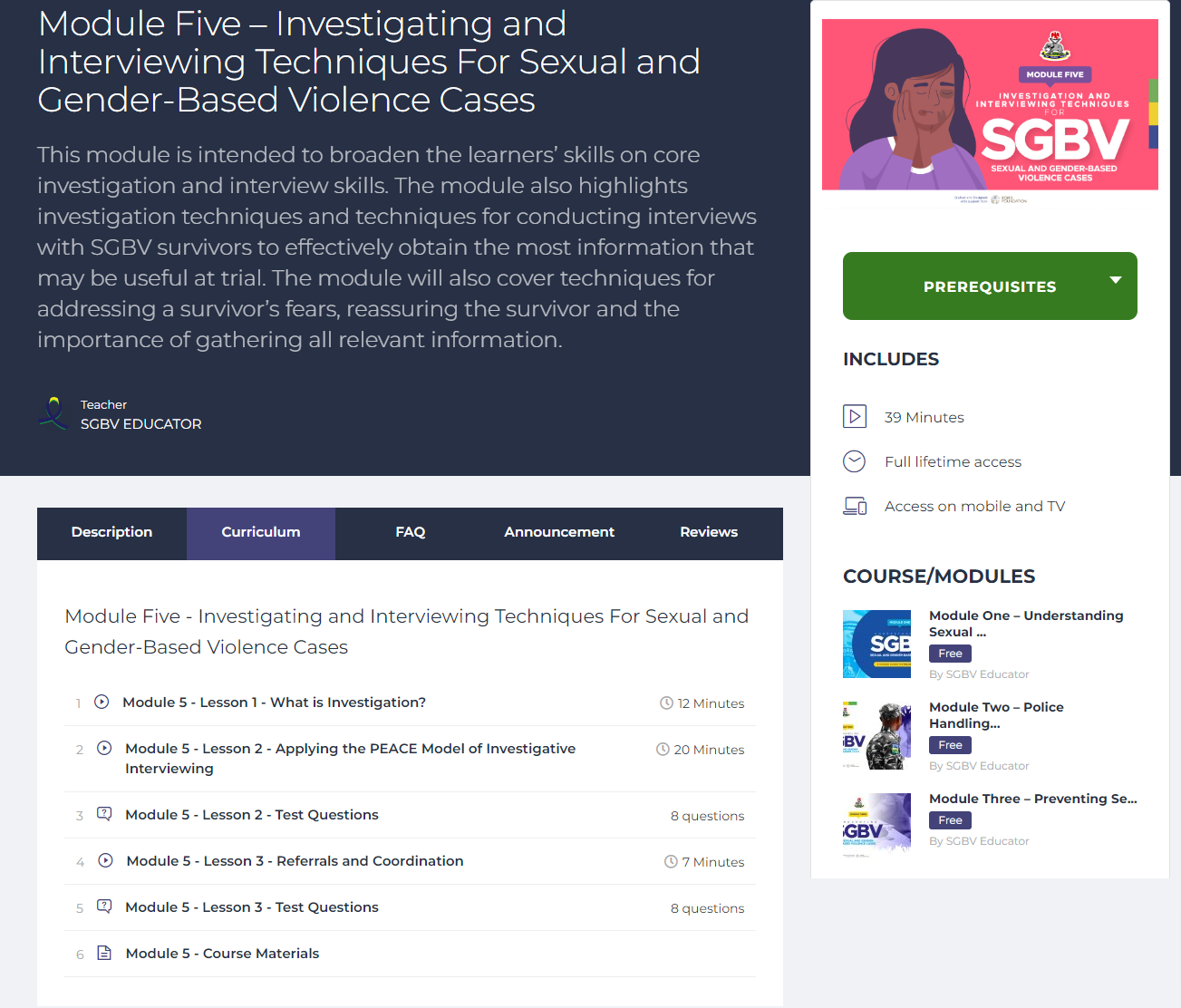How It Works
Steps:

Sign Up/ Log in:
Use the “Sign Up” to register if you are a new participant or the “Log in” button if you have an existing account.
Get Activated:
After signing up you will receive a link to activate your account.

Select Module:
Once activated, you can access the course catalogue to select the module you’d love to start with. There are five modules in the course and we highly recommend that you start from module one and progress to module five.

Start Learning
Start learning on the go and progress at your pace
Course Features:
-
Detailed Landing Page: Each course/module offers a dedicated page with descriptions, curriculum details, FAQs, announcements, and user reviews.
-
Comprehensive Content: Modules cover key concepts, case-handling procedures, investigation techniques, prosecution strategies, and data management practices.
-
Interactive Learning: Engaging learning format with resources like videos, quizzes, and case studies.
Additional Resources:
Acronyms and Abbreviations
During your online study, you will find some words abbreviated while some serve as acronyms. Below are some of the acronyms and abbreviations.
CSO – Civil Society Organization
COVID-19 – Corona Virus Disease 2019
GBV – Gender-Based Violence
NPF – Nigeria Police Force
SGBV – Sexual and Gender-Based Violence
UN Women – United Nations Entity for Gender Equality and the Empowerment of Women
VAPP – Violence Against Persons (Prohibition) [Act]
Definition of Terms
Accused – Someone against whom a civil or criminal case is brought.
Alternate dispute resolution – A mechanism and structure put in place by some state governments to intervene in some cases to decongest the justice system. Cases of sexual violence are, however, criminal offences that must be prosecuted.
Arrest – To take a suspect or a perpetrator by legal authority into custody.
Conviction – Finding a suspect guilty of an offence by establishing the crime committed against the person through a court judgment.
Court order – An official proclamation by a competent court of law directing certain steps to be taken in a case.
Defendant – Someone against whom a criminal or civil case is brought.
Detention – An act of holding someone in custody for legal reasons.
Evidence – Any object, material or item that may be submitted to prove a case or establish a fact in a court to establish the truth about a matter under investigation in the court.
Exhibit – Evidence provided to support a criminal charge against a suspect. It could be an object or photograph.
Interrogation – A process of questioning to get details about certain cases or to establish facts. It is usually done systematically.
Interview – To make deliberate efforts to gain relevant information from parties involved in a case.
Party – A person, entity or institution involved in a lawsuit. It implies both the defendant and the respondent, which also in this case refers to the survivor and the suspect.
Prosecution – A process of establishing a criminal charge against someone in a court of law by an authorized institution such as the police.
Remand – Keeping an accused person or suspect in the custody of a legal or competent authority such as the Nigerian Correctional Service.
Suspect – A known person accused of a certain crime.
Warrant – A written statement permitting or authorizing a law enforcement officer to undertake an act including arrest and search.
Witness – Someone who appears in a court of law to give additional information about what s/he knows in a criminal or civil proceeding.
Technical Support:
Contact our technical support team [email protected] for any technical issues.
Your Journey Begins Here
The SGBV E-Training Portal equips you with the knowledge and skills to address SGBV issues in Nigeria effectively. Start your learning journey today and contribute to a safer future for all.
Happy learning!
Modules
-
Module One – Understanding Sexual and Gender-based Violence
-
Module Two – Police Handling Sexual and Gender-Based Violence Cases
-
Module Three – Preventing Sexual and Gender-Based Violence
-
Module Four – Responding to Sexual and Gender-Based Violence (SGBV) Cases
-
Module Five – Investigating and Interviewing Techniques For Sexual and Gender-Based Violence Cases
